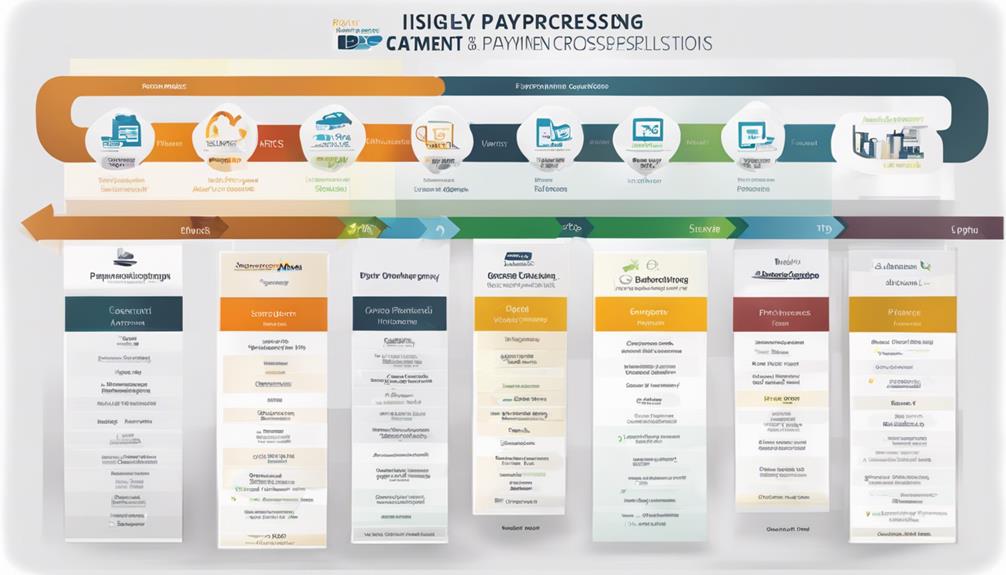Exploring the legal aspects of credit card processing involves fulfilling seven essential responsibilities. These include verifying the legitimacy of card issuance, adhering to PCI standards, obtaining consumer consent for adding credit features, accurately verifying cards, following processing regulations, safeguarding consumers, and avoiding penalties. Compliance, fraud prevention, consumer protection, and penalties avoidance are all crucial components. By grasping and carrying out these obligations, businesses uphold trust, security, and integrity in transactions. In-depth explanations delve into the importance of each responsibility, providing a deeper understanding of the complex realm of credit card processing responsibilities.
Key Takeaways
- Compliance with PCI standards is crucial for data security.
- Adherence to regulations prevents unauthorized access.
- Obtain consumer consent before adding credit features.
- Severe consequences for non-compliance include fines and loss of privileges.
- Consumer Protection Laws safeguard consumer rights and sensitive information.
Issuance of Credit Cards
When issuing credit cards, we must guarantee they're only provided in response to a request or application. It's essential to make sure that the issuance of credit cards complies with legal responsibilities.
This process involves key duties such as verifying that the request or application meets the necessary criteria for issuing a credit card. Whether the request is made orally or in writing, it must be carefully processed to prevent any unauthorized issuance.
Additionally, credit features added to non-credit cards should be considered as the issuance of a credit card and handled accordingly. Credit cards can also be issued to authorized users as requested, but it's vital to confirm the legitimacy of such requests.
Adherence to Regulations

Compliance with PCI standards is an essential requirement in credit card processing to guarantee the security of cardholder data. Adherence to these standards ensures that sensitive information is protected through the implementation of robust security protocols. Failing to comply with credit card acceptance regulations can result in severe consequences, including financial penalties and reputational damage. Hence, it's vital for businesses to prioritize regulatory compliance to maintain data protection and consumer trust.
Regular training on security measures is recommended to make sure that all staff members are aware of and adhere to the relevant regulations. By staying informed and up to date on compliance requirements, businesses can mitigate potential risks associated with non-compliance. Implementing data protection measures is also critical to safeguarding sensitive cardholder information and preventing unauthorized access.
Addition of Credit Features
When considering the addition of credit features to existing cards, it's important to understand the various types of credit features available, how they're implemented, and the potential impact on the user experience.
By knowing these points, issuers can make informed decisions that comply with regulations and meet consumer needs effectively.
Understanding the nuances of credit feature types, implementation considerations, and user experience impact is essential for ensuring legal responsibilities are met in credit card processing.
Credit Feature Types
Adding credit features to non-credit cards requires explicit consumer consent to adhere to regulations and avoid violations. Non-credit cards cannot have credit features added without consumer permission, as this would violate regulations. The connection between non-credit cards and credit plans must be based on consumer request to ensure adherence. Purchase-price discount cards can be sent unsolicited if not linked to credit plans, but if they include credit features, they must follow regulations. Violations occur when credit features are added to non-credit cards without consumer permission, emphasizing the importance of required disclosures. Ensuring compliance with rules against unsolicited issuance is essential for non-credit cards to uphold consumer protection standards.
| Credit Feature Types | Regulatory Requirements |
|---|---|
| Non-credit cards | Explicit consumer consent |
| Purchase-price discount cards | Compliance with regulations |
| Violations | Consumer permission required |
Implementation Considerations
Considering consumer preferences and regulatory guidelines, our team evaluates the best approach for implementing credit features onto non-credit cards. Issuers must make certain that consumer consent is explicitly obtained before linking non-credit cards to credit plans to avoid violations.
Compliance with regulations is essential when integrating credit features into non-credit cards, necessitating the provision of necessary disclosures to users. Unsolicited issuance of non-credit cards connected to credit plans is strictly prohibited to uphold legal standards.
User Experience Impact
We've observed a noticeable enhancement in user experience by guaranteeing the introduction of credit features to non-credit cards, primarily by offering increased payment flexibility.
- Adding credit features to non-credit cards can improve customer satisfaction levels.
- The availability of credit features upon request can lead to higher card usage rates.
- Issuers must guarantee that consumers explicitly opt for credit features on non-credit cards to meet regulatory requirements.
- Unauthorized addition of credit features to non-credit cards can result in legal penalties and violations of consumer protection laws.
Accurate Card Issuance

When issuing credit cards, it's essential to maintain accuracy in the card issuance process. This involves thorough card verification processes, implementing effective fraud prevention measures, and ensuring compliance with all relevant regulations.
Card Verification Processes
How can card verification processes guarantee the accurate issuance of credit cards based on consumer requests or applications?
Card verification secures compliance with Regulation Z by matching card details with requested features. Unsolicited issuance of credit cards is prohibited unless specifically requested by the consumer. Adherence to regulations is essential to maintain accurate card issuance practices and prevent unauthorized use, ultimately safeguarding consumer protection. By following these processes diligently, issuers fulfill their responsibilities to accurately issue credit cards based on consumer requests, promoting transparency and trust in the credit card processing system.
- Card verification secures compliance with Regulation Z.
- Unsolicited issuance of credit cards is prohibited without consumer request.
- Adherence to regulations is essential for accurate card issuance.
- Verification processes safeguard consumer protection and prevent unauthorized use.
Fraud Prevention Measures
Implementing strong fraud prevention measures is vital for ensuring the accurate issuance of credit cards and safeguarding consumers against unauthorized use. Card issuance must be done accurately to prevent fraud and protect consumers.
Unsolicited issuance of credit cards is strictly prohibited to avoid fraudulent activities. Issuers are required to comply with Regulation Z, ensuring that consumer consent is obtained before adding credit features to non-credit cards.
Violations of accurate card issuance regulations can result in severe penalties and legal consequences for issuers. It's essential for issuers to understand their responsibilities in preventing fraud and ensuring compliance with regulations to maintain trust with consumers and avoid legal trouble.
Compliance With Regulations
In order to guarantee compliance with regulations regarding accurate card issuance, issuers must meticulously verify that credit cards are only provided in response to a valid request or application.
- Issuers must confirm requests for credit cards are either oral or written, aligning with regulatory standards.
- Adding a credit feature to a non-credit card necessitates adherence to specific rules for issuing credit cards.
- Credit cards can be issued to authorized users at the primary cardholder's request, following regulatory guidelines.
- Unsolicited issuance of non-credit cards, unless tied to credit plans, is prohibited to maintain compliance with regulations.
Compliance With Rules

Maintaining compliance with credit card processing rules is a crucial aspect of protecting cardholder data and upholding trust with customers and financial institutions. Adhering to regulations is essential for safeguarding sensitive cardholder information, as failure to comply with these rules can result in severe consequences such as fines and the loss of merchant privileges. Following established rules not only aids in preserving trust but also guarantees a secure transaction environment and shields against fraud.
To achieve adherence, regular training and updates are necessary to stay current with evolving regulations in the credit card processing industry. This ongoing commitment to training is essential for all individuals involved in credit card processing to comprehend their responsibilities and obligations. By remaining informed and up to date with the latest rules and best practices, businesses can effectively mitigate risks and uphold the integrity of the payment process. Compliance with these rules is a non-negotiable obligation that must be prioritized to operate ethically and securely in the credit card processing landscape.
Consumer Protection

Staying compliant with credit card processing rules not only safeguards sensitive information but also guarantees consumer protection through various regulatory measures.
- Consumer Protection Laws: These laws guarantee fair treatment and safeguard consumer rights in credit card transactions, providing a safety net for consumers.
- Truth in Lending Act (Regulation Z): This regulation mandates transparency on credit card terms and fees, empowering consumers with essential information.
- Fair Credit Billing Act: Consumers can dispute billing errors thanks to this act, which also ensures prompt resolution by credit card issuers in case of disputes.
- Electronic Fund Transfer Act: This act mandates disclosures and limits liability for unauthorized transactions on debit and credit cards, enhancing consumer security in electronic transactions.
Avoidance of Penalties

To avoid penalties in credit card processing, merchants must diligently adhere to PCI DSS guidelines and legal requirements for safeguarding cardholder data. Non-compliance with credit card processing regulations can lead to severe consequences, including monetary fines, reputational damage, and suspension of processing privileges.
It's essential for merchants to prioritize cardholder data protection by implementing robust security measures that prevent unauthorized access. Strict adherence to PCI DSS guidelines and other legal requirements is vital to avoid costly penalties for non-compliance.
Regular monitoring and training are key components in ensuring ongoing compliance with these regulations. By staying informed and proactive in maintaining a secure processing environment, merchants can mitigate the risk of facing non-compliance penalties that could harm both their finances and reputation in the industry.
Prioritizing the protection of cardholder data isn't just a legal obligation but also a critical step in maintaining trust with customers and securing the longevity of the business.
Frequently Asked Questions
What Are the Roles and Responsibilities of Payment Processing?
When it comes to payment processing, our roles and responsibilities cover a wide range of tasks.
From managing daily transactions to ensuring compliance with PCI standards, we play an essential role in safeguarding sensitive financial information. This involves implementing security controls, monitoring gateways, and responding promptly to any security breaches.
Regular audits, data backups, and adherence to strict procedures are essential in maintaining the integrity of credit card processing systems.
What Are the Responsibilities of a Credit Card Company?
Credit card companies have important responsibilities, including safeguarding cardholder data, investigating security breaches promptly, and ensuring compliance with PCI DSS guidelines.
We must provide secure data transmission methods, protect sensitive information during transactions, and follow regulations like Regulation Z for fair practices.
Issuers must also adhere to strict guidelines for issuing credit cards and adding credit features. These duties are essential to maintaining trust and security in the credit card industry.
What Is the Role of a Credit Card Processing?
Credit card processing is essential for businesses to accept electronic payments from customers. It involves authorizing, authenticating, and settling credit card transactions efficiently. Processors play a pivotal role in transferring funds between customers, merchants, and financial institutions securely.
Compliance with legal regulations and industry standards is necessary to safeguard cardholder data. Overall, credit card processing services guarantee smooth and secure electronic payment transactions for businesses and consumers alike.
What Law Must You Follow if You Handle Credit Card Information?
When handling credit card information, we must abide by the Payment Card Industry Data Security Standard (PCI DSS) to guarantee a secure environment. Compliance with PCI DSS protects cardholder data, reducing the risk of breaches and fraud.
Failure to comply with the standards can lead to financial penalties, reputation damage, and legal consequences. By following PCI DSS guidelines, we demonstrate our commitment to safeguarding sensitive information and maintaining trust with customers.
What Are the 7 Key Duties of Credit Card Processing Legal Responsibilities?
Credit card processing legal responsibilities include ensuring compliance with industry regulations, protecting sensitive customer data, and maintaining accurate transaction records. Merchants also have a duty to disclose fees to customers and handle chargebacks in accordance with legal credit card responsibilities. Properly managing these duties can prevent costly legal issues.
Conclusion
To wrap up, the legal responsibilities of credit card processing are essential for ensuring the security and integrity of financial transactions.
Did you know that in 2020, the Federal Trade Commission received over 2 million reports of fraud, with credit card fraud being one of the most common types reported?
By understanding and fulfilling these key duties, businesses can protect both themselves and their customers from potential risks and liabilities.
Stay informed and compliant to safeguard your financial interests.









